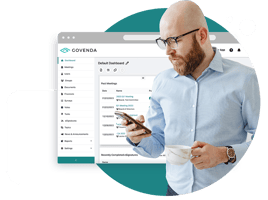Global entity management is an integral aspect of governance for large corporations. It can be costly, time-consuming, and overwhelming if you do not use the best strategies and tools to organize everything you need to track and make it available to the appropriate people.
Centralize compliance, regulatory filings, and record-keeping
Decentralized compliance, regulatory filings, and record-keeping is a disaster waiting to happen. Decentralization can all too often mean disorganization. Missing regulatory filing deadlines, ignoring compliance, and sloppy record-keeping at best will slow your business growth and at worst can actually threaten the health and future of your business.
 By centralizing all compliance, regulatory filing, and record-keeping in one central system, you can ensure that your employees, corporate secretaries, paralegals, directors, and other shareholders know what needs to be done when and have the tools to execute their business functions at their fingertips.
By centralizing all compliance, regulatory filing, and record-keeping in one central system, you can ensure that your employees, corporate secretaries, paralegals, directors, and other shareholders know what needs to be done when and have the tools to execute their business functions at their fingertips.
As that information is updated, people in different departments may need to add and edit documents. The tricky part is to limit those documents to the specific people who need to change them and not allow others to edit or even access them. With Govenda board portal software, three admins levels enable organizations to improve efficiency while controlling how much information administrators of Govenda can view.
Separate the data into categories of which groups of people need to access them and for what purposes.
Establishing a Governance & Compliance Program
The compliance department focuses on preventing violations of external laws and regulations and maintaining the company’s internal standards to protect the company and avoid being harmed by waste, fraud, and abuse. Compliance officers need to access records when reporting to regulatory bodies, whether they are governmental or industry-specific, and when reporting internally on policies and procedures. Consequences for not staying in compliance can range from small fines and sanctions up to imprisonment, but a well-maintained corporate compliance program will be a crucial defense if your company has legal issues.
Compliance for Multinational Corporations
Compliance is more complicated for multinational corporations doing business in multiple countries with varying regulations, particularly since regulators became more aggressive following the 2008 financial crisis.
For multinational corporations, it may make sense to categorize records by which country requires them. Make sure it’s evident to those who handle your data, both in the host country and in the home country, how it is organized and whether they may need to update records for more than one country.
Secure Access to Entity Information
The compliance department works closely with the governance department, which partners with it to minimize the corporation’s risk level. The governance department implements company leaders’ plans for policies and structures, and it tries to head off future risks.
 Other groups who need to access parts of the data you oversee independently are senior management and the board of directors. These leaders are responsible for modeling high standards and integrity in the workplace, promoting those standards to everyone else, and making sure they address any issues swiftly.
Other groups who need to access parts of the data you oversee independently are senior management and the board of directors. These leaders are responsible for modeling high standards and integrity in the workplace, promoting those standards to everyone else, and making sure they address any issues swiftly.
Members of your management team will need to access and edit documents related to daily business activities, the organization’s overall structure and any changes to it, and internal procedures and reviews. They may need to be involved in coordinating reports from multiple departments.
The board of directors needs access to documents to understand how the compliance program is running, and when there is a potential compliance violation. It should be empowered to address issues before they become more significant problems. In addition, the board generates its own data, such as meeting minutes, that need to be available for members and for others who need to review and implement the board’s decisions.
Leverage Technology For Compliance
Technology brings order to subsidiary management chaos. But not just any technology. Technology in and of itself can cause more problems than it solves if not leveraged appropriately. If you are considering moving to or upgrading your entity management platform, make sure you accurately assess your needs and wants before signing on the dotted line with a vendor.
You want a system that meets your entity’s evolving needs for governance, compliance and record-keeping. Integration is important, as you want technology that will easily work with systems that you already have.
When you look for board portal software that will help you track your data, look for a secure, flexible, user-friendly, and convenient system. Keep in mind the needs of the different constituencies who will use the software. Your IT professionals should test it to make sure it is exceptionally secure. You will want a state of the art environment with dedicated servers, back up sites, and data retention features.
 When shopping for a solution, make sure you look at the cost savings of using a board portal versus paper or more complex software solutions. Global entity management is essential for every corporate secretary, but it does not always have to be costly and time-consuming. By using a board portal solution such as Govenda, you can save both time and money.
When shopping for a solution, make sure you look at the cost savings of using a board portal versus paper or more complex software solutions. Global entity management is essential for every corporate secretary, but it does not always have to be costly and time-consuming. By using a board portal solution such as Govenda, you can save both time and money.
Govenda is built to help organizations to mitigate the governance and compliance risks inherent in governing highly regulated organizations. Govenda helps to improve governance to better ensure compliance and enhance decision-making. Start a conversation today to see how Govenda’s board management software can help your organization move towards more seamless compliance management.
Other posts you might be interested in
View All Posts
Building Board Efficiency with Task Management
Read More
Innovating Risk Management for Bank and Financial Board Governance
Read More
What is Board Management Software?
Read MoreSubscribe to email updates
Get updates delivered directly to your inbox.
 Board Management Software for Better Governance
Board Management Software for Better Governance Govenda Brochure
Govenda Brochure